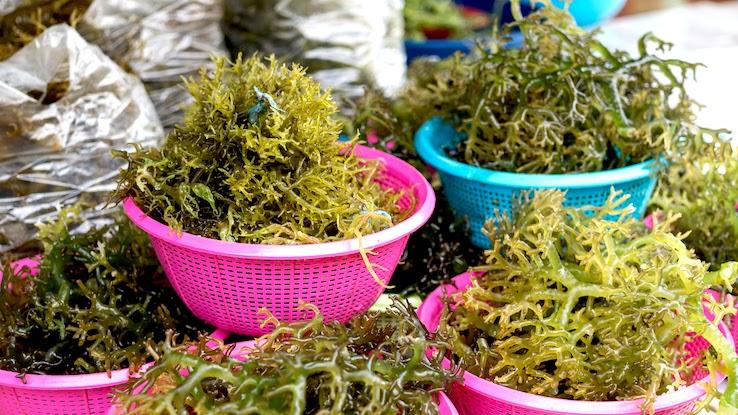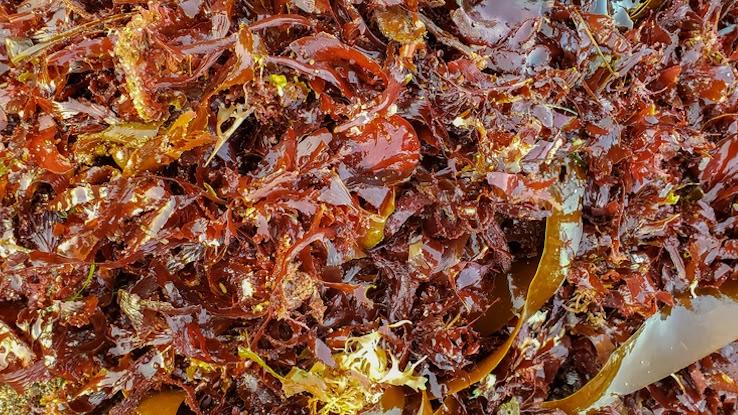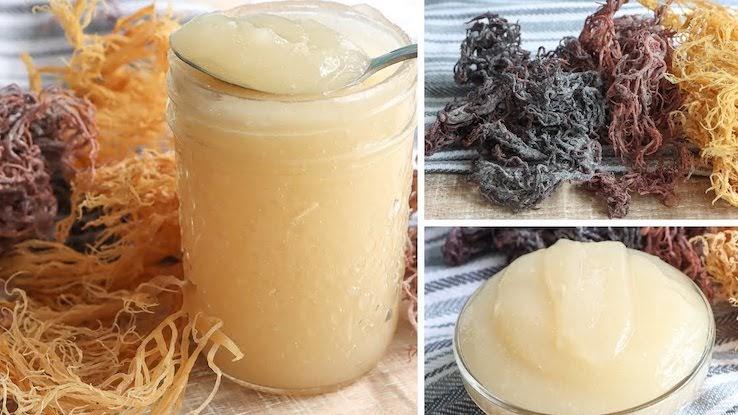Take Me to the Sea Again

Sea moss has officially become one of the biggest health trends to hit the superfood scene lately. Celebrities, influencers and health gurus are singing the supplement's praises, claiming that it assists with everything from improving digestion to clearing up inflamed skin, among other benefits. But is there any validity to these claims, or is it just a case of effective marketing at work?
Seeing as how it's grown in popularity in recent years, many people are now using sea moss in smoothies and other meals, as a regular supplement and even by choosing skincare products that contain it. But can this type of algae do everything people claim? To answer this question, learn what sea moss is, what benefits it has and whether there are any potential downsides of using it regularly.
What Is Sea Moss?

Sea moss, sometimes called Irish moss, is a type of red algae that's also seaweed — seaweed itself is a type of algae. This species of plantlike algae is found on the Atlantic coast of the British Isles, as well as around Europe and parts of North America. In the United States, it's commonly harvested in New England and used commercially as a source of carrageenan, a gelatinous carbohydrate that thickens and stabilizes baked goods and cosmetics. Scientists are just beginning to dive deeper into studying sea moss, but different populations have been using it for years in different forms.
Though sea moss hasn't become too popular in the United States until recently, people in other countries have been using it for medicinal purposes for hundreds of years. "Irish sea moss has been used for generations in places like Ireland, Scotland and Jamaica in food and as folk medicine," Robin Foroutan, R.D.N., spokesperson for the Academy of Nutrition and Dietetics, shared with Shape. In fact, one of the reasons why sea moss is also known as Irish moss is not only due to the waters where it grows but also because it was often used as a source of nutrients during the Irish Potato Famine of the 1800s.
Most likely, you've already (unknowingly) encountered sea moss because it appears in many different food products and cosmetics as a stabilizing and gelling agent. However, you may want to start consuming or using it intentionally. That's because this type of seaweed is full of different minerals and nutrients that can be highly beneficial for your overall health, including:
- Magnesium
- Calcium
- Vitamins B12 & B2
- Vitamin C
- Zinc
- Iron
- Iodine
- Fiber
Sea moss also possesses antimicrobial and anti-inflammatory properties, which is why this algae is also making a name for itself as a helpful ingredient in skincare products.
What Health Benefits Can Sea Moss Support?

Research on sea moss' potential is still ongoing, and the body of scientific literature about this seaweed is still growing. However, people anecdotally report seeing a variety of different health effects from using sea moss, and there are many different ways that sea moss could possibly help improve your health.
One of the primary benefits of using this supplement is that it may help soothe the mucous membranes, which could ease your breathing. It's also rich in dietary fiber, which may promote digestive health. Sea moss is also high in immune-boosting nutrients like iron, magnesium, phosphorus and zinc, which can help strengthen your immune system to fight off illnesses. Sea moss is rich in iodine, which provides support to the thyroid and makes thyroid hormones to help regulate your metabolism and encourage bone and brain development.
Sea moss is also a helpful addition to your daily skincare routine. It has vitamin A, vitamin K and omega-3 fatty acids, "which help to hydrate and promote healthy skin cell function," according to Dr. Joshua Zeichner, director of cosmetic and clinical research in the department of dermatology at New York's Mount Sinai Hospital. "It's rich in sulfur, which is known to lower levels of microorganisms on the skin and soothe inflammation," he told Shape.
In What Forms Can You Take Sea Moss?

Sea moss is fibrous and has a strong, salty flavor in its natural form. For that reason, most people choose to alter it in some way to either ingest or apply it topically. Instead of using it in its raw form, people often turn it into a gel for easier use — and you can do this at home, too.
Soak dried sea moss in water for a day, and then blend it in a food processor, adding water until the mixture reaches a smooth consistency. You can use this gel in small amounts — a tablespoon or so — as a thickener for soups, desserts and smoothies. Once your prepared sea moss is ready, you can store it in the fridge for up to two weeks.
Some people use sea moss directly on their skin as a face mask or serve it as a drink, boiled with water and mixed with milk and sugar or honey. Because of its growing popularity, the algae is also now found in powdered and pill forms for even easier digestion.
Whatever form you buy sea moss in, you want to make sure it comes from a reliable source for the best effect. Preferably, you want to buy wild-harvested sea moss straight from the sea. A lot of the so-called "organic" sea moss in stores, which is grown by suppliers in artificial salt pools (think "farm-raised" sea moss), has preservatives to last longer, but that means it's often lacking the nutrients and minerals you want most.
Are There Any Side Effects of Using Sea Moss?

Though there are great health benefits to using sea moss, experts warn of potential side effects, especially if you use too much at one time. Because there have not been extensive studies on the effects on pregnant people and babies, those who are expecting or breastfeeding should not take sea moss at all. For these reasons, it's also vital to discuss sea moss with your physician before you begin ingesting it.
Because sea moss has iodine in it, using an excessive amount can lead to an enlarged thyroid. If you have any health conditions related to your thyroid, you may want to avoid sea moss entirely. It can also cause nausea and diarrhea. If you do notice any side effects, including rashes or nausea, discontinue use and consult your doctor. Moderation is key when using this supplement.
Resource Links:
https://www.britannica.com/science/Irish-moss
https://www.foodingredientfacts.org/irish-moss-the-history-of-carrageenans-roots/
https://www.today.com/health/irish-sea-moss-benefits-should-you-try-it-expert-weighs-t191022
https://fdc.nal.usda.gov/fdc-app.html#/food-details/168456/nutrients
https://www.ncbi.nlm.nih.gov/pmc/articles/PMC4535385/
https://ods.od.nih.gov/factsheets/Iodine-Consumer/
https://www.shape.com/healthy-eating/diet-tips/irish-sea-moss-benefits-carrageen
https://www.ncbi.nlm.nih.gov/pmc/articles/PMC3976240/
pritchardmakentance.blogspot.com
Source: https://www.symptomfind.com/nutrition-supplements/health-benefits-sea-moss?utm_content=params%3Ao%3D740013%26ad%3DdirN%26qo%3DserpIndex
0 Response to "Take Me to the Sea Again"
Post a Comment